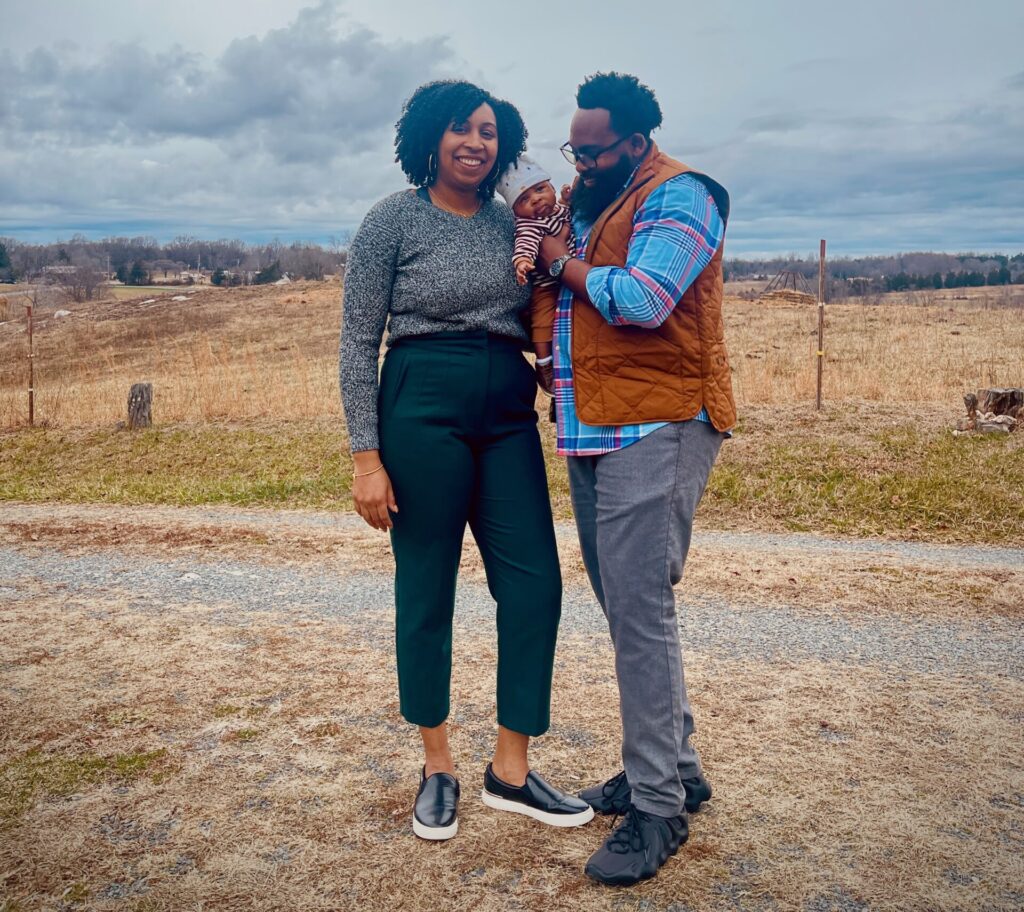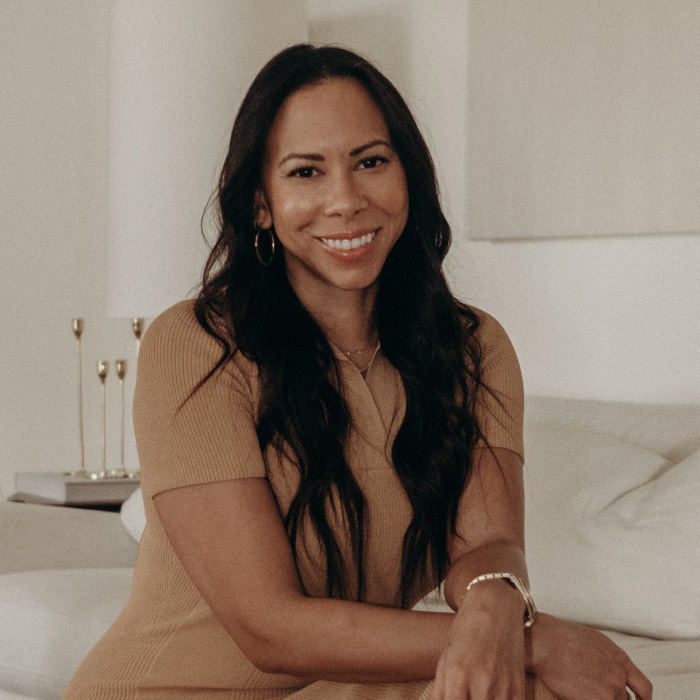“First comes love, then comes marriage, then comes a baby in a baby carriage.”
But making a family is not as simple as the nursery rhyme many of us grew up singing suggests. Sweet July spoke with five couples about the kind of family they want and how they navigate a culture that assumes everyone desires children, can have them, or should have them in a certain way. That culture routinely shows itself in intrusive comments and questions: “Why aren’t you drinking tonight? Are you pregnant?” “Is that happy weight gain or…?” “You’ve been married a year…” “I’d like to have grandkids before I’m too old to enjoy them.”
Ariel Martin encounters these questions on a regular basis.
“And I’m like, are you going to be there at 2 a.m. to feed them, or are you going to change them? Are you going to pay $300 for a stroller? I get sick of those questions because they want the fun little fat baby for half an hour. And then it’s our job to raise them and teach them and take care of them,” she says.
Ariel and her husband, Nathan, married two years ago and want a family. Nathan, a structural design engineer at Boeing, believes kids are a gift from God and a privilege. Ariel, a technical writer at SAIC, believes kids are beautiful and her husband would make a great dad.
However, the Martins didn’t want to get pregnant right away. There is a lot to figure out, they said including: getting to know each other on an even deeper level; figuring out how to deal with money, stress, and travel; and establishing their home in Huntsville, Alabama together.

“I want to feel satisfied with the years that it was just me and my wife,” said Nathan. “I want to feel like we traveled enough. I want to feel like we had all the sex that we wanted—in all the craziest, coolest ways. I want to feel like we ate at all the restaurants, we had all the dates, and we had all the people over at our house. I want to feel like we did it all and that I’m satisfied.”
That choice has elicited many unwelcome comments, particularly from elders. Ariel sometimes wants to rebel and not have children at all to prove that her sole purpose isn’t baby-making. It took a lot of work for her to get comfortable with the idea of having kids in the first place.
“I didn’t want kids for a lot of reasons. This world is not a pretty place. I didn’t feel like I would be a good mom. I never felt like I had the ability to create a place where I would want to bring a person in. But those feelings have changed,” she shares. “I’ve always struggled with perfectionism…Getting married has helped me to shed some of that perfectionism.”
The Martins strongly feel that someone else’s situation or feelings—be it aging, desiring grandbabies, or having ideas about when a couple should start having kids—shouldn’t play a part in their decision. A marriage is composed of you, your spouse, and God, they say. Those are the only voices that should shape your decisions and have the final say.
Aaron and Amber: A couple is a family

Aaron and Amber Ball, married for three years, also believe that the “to kid or not to kid” decision is personal. Based in Philadelphia, Pennsylvania, they tell Sweet July they’re open to having kids but aren’t interested in having them right now. “To bring another individual life form into play is a whole other level,” says Aaron, a “Scrum Master” currently working in information technology.
Amber, a social media advertiser, is no longer surprised at being asked about her fertility plans and decisions. When she was single, a close loved one pressed her about why she didn’t want children, even asking why she planned to get married if kids weren’t part of her plan. Being raised in a Caribbean family, Amber was tired of explaining that she wanted lovemaking in a marriage but not necessarily children. Once she and Aaron married, her loctician also couldn’t understand that Amber wasn’t looking to have children. In the middle of a re-twist, she asked Amber whether she was on birth control. When Amber said no, other women in the salon chimed in, making comments that, inevitably, Amber would wind up pregnant.
After being backed into a corner with many personal questions about why she didn’t want to have sex outside of marriage, what her moral values are, and her birth control choices, Amber told Sweet July that she realized early to set boundaries around this topic of conversation. To those who’ve kept trying to convince her that she would and should want kids, she’s had to communicate that she didn’t want them when she was single, she doesn’t now that she’s married, and she doesn’t believe marriage is just for the sake of having kids.
Having been asked what the purpose of getting married is if they’re not going to have kids, the Balls resent the implication that they are incomplete. “Sometimes family members think that when you bring a kid into the realm, now you’re a true family. Who created that? That doesn’t make sense, like a kid is going to complete the family…I’ve had to gently correct them on that,” says Aaron. Pointing to his wife and himself, Aaron declares, “We’re a family.”
Aaron encourages other couples not to give in to conforming to the norm because of what everyone else is doing. He refuses to keep up with the Joneses. Importantly, says Amber, “Be okay with saying you don’t want kids—because that is okay, too.”
Trey and Tara: Looking inward, looking outward

For some couples, parenting is not always medically possible—and that can be hard on a relationship. But Trey and Tara Carroll found a joint purpose and a deeper connection after a pregnancy loss.
The Carrolls, based in Phoenix, Arizona, tried to get pregnant a year after their wedding. Trey, a critical facility engineer, was leaving on military deployment, and Tara, a full-time content creator, model and actress, hoped that a baby Carroll would help her cope with the grief of her husband being away. Tara conceived in 2017, but it was an ectopic pregnancy when a fertilized egg grows outside of the uterus. As the pregnancy develops, it becomes too large for the fallopian tube and ruptures, leading to severe bleeding and even death. In order to save the life of the pregnant person, the pregnancy can’t continue, and sometimes the fallopian tube itself must be removed, which can reduce the chance of future pregnancies.
Tara told Sweet July, “We had a family member on the phone while I was in the ER. And the family member [said to Trey], ‘I mean, are you sure you want to be with her? Because what if you want to have kids?’” The comment hurt Tara deeply because it suggested that kids were all she had to offer Trey. Those words created relationship pressure that hadn’t previously existed, and the Carrolls began questioning their foundation and whether their partner still wanted to be with them.
“We were really picking ourselves apart because of what other people had said… And I see now, it just wasn’t our time,” Tara told Sweet July. Once Tara healed, she and Trey decided to wait to have kids and are now blessed with two toddler sons.
Going through this traumatic event, the Carrolls learned that they needed to be solid and tight as a couple, with or without kids. Trey recognized that other people who emphasized kids so much were forgetting about the importance of stable relationships between two healthy people. It was hard for Tara to see other couples blessed with a child, but she channeled that grief and deferred hope into continuing to build her foundation with Trey, unpacking her trauma and working out the kinks in their marriage.
Together, the couple created “Love Always Wins, That’s Law!,” a family brand that promotes unconditional, intentional, and accountable love through mentorship and relationship coaching, a marriage workbook, and a couples retreat.
Tara often advises other couples not to let other people “drive any type of wedge between what you and your partner have going for you.” Trey echoes that sentiment: “Use your marriage to build that love that you would want to bring the child into. Use that as the blueprint on how you want to embrace the child and what you want the love to look like when y’all have a baby.”
Gary and Gabby: A dream deferred
Married in Atlanta, Georgia, in 2019, Gary and Gabby Ejiofor (these names have been changed) found friends and family expected a baby immediately after they wed because they’d dated for seven years. But Gabby wanted to wait so she and Gary could settle into this new chapter of their relationship.
In early 2021, however, Gary, a commercial deposit analyst, was diagnosed with cancer after going to his doctor for chest pain. Six months of chemotherapy and radiation forced Gary to face the possibility he might not be able to father a child.
He explains: “Chemo is something that’s going to kill all fast-splitting cells in your body, and that’s why people lose their hair… But it also is the reason why people deal with infertility and low sperm counts because it completely wipes that stuff out.”
Questions about when the couple would have children, especially from Gary’s Nigerian community, kept coming. Those queries continued post-treatment as he attempted to recover and work through his disappointment. Feeling raw and annoyed by them, he soon realized that most people don’t understand chemo’s effects. That allowed him to extend grace when people continued to ask why he and Gabby weren’t having kids yet.
Furthermore, engaging in vulnerable conversations with friends and seeking spiritual advice helped Gary work through the resentment he felt toward his wife. He initially struggled because if he’d had it his way, they would have had at least one kid by the time of the cancer prognosis.
“It was more so me projecting my anger and disappointment on Gabby when it had nothing to do with her. It was me being upset about everything I just went through and how it was still affecting me. I couldn’t even fathom the idea of giving voice to the fact that I was truly disappointed with God because of everything that took place.”
Two years later, the Ejiofors began an in vitro fertilization (IVF) journey—a process that is neither cheap nor easy. IVF uses a combination of medicines and surgical procedures to help sperm fertilize an egg outside the body and then implant it into the uterus. It sometimes works on the first try, but many people need more than one round to get pregnant.
Several months of fertility treatments wore on the Ejiofors. Gabby, an educator, tells Sweet July that she questioned herself: “If I have to go through all of this, do I even want to continue to do it? Like I want a baby, but this is a lot. Then, going through the process and people still asking you when are y’all going to have kids? I am literally exhausted. My body is exhausted right now. Do you know I am fighting my own battle trying to have this child?”
After surgery and nightly injections over eight months, Gary and Gabby finally became pregnant in November 2023. They acknowledge that they are privileged to have been able to fund this journey financially. Prices in Atlanta for IVF can range from $7,940 to $20,855 per cycle.
Taylor and Jaz Vick: Getting to the roots

Experiencing polycystic ovary syndrome (PCOS), Taylor Vick, a toxicologist, has learned firsthand that asking someone about kids could seem like a simple question. But it can be loaded and painful, as it was for the Ejiofors. So she was adamant about setting boundaries—and the record straight—when people took it upon themselves to discuss her and her husband’s reproductive choices.
“One of the most hurtful comments I remember was, ‘You don’t even know what happiness is until you have kids,’” she recalls. Instead of avoiding confrontation, Taylor called out the comments in the moment. She says: “You don’t know what people are deciding. You don’t know if people don’t want kids. You don’t know if people can’t have kids and have multiple issues.’”
Jaz Vick, with an educational background in sociology and divinity, points to the roots of these societal expectations in the United States’ agricultural past. “There was a point in our history where you needed to have a bunch of kids because they were on the farm working,” he says.
A former pastor of six years at an Atlanta-based church, he also points to surface readings of the Bible and the resulting warped theology, absent of any contextualization, as another root of this pressure. People often cherrypick scripture to justify why married people should have kids, regardless of the state of their relationship, finances, or desire to have kids.
Jaz points to Psalms 127:3-5 as one of those scriptures used. The New International Version (NIV) reads, “Children are a heritage from the Lord, offspring a reward from him. Like arrows in the hands of a warrior are children born in one’s youth. Blessed is the man whose quiver is full of them.”
He says: “People can take that and try to create an entire theology around why you shouldn’t use prophylactics…Specifically in church spaces, it can become ‘you are hindering a blessing from God if you’re not trying to have kids.’”
Jaz and Taylor reject the norms that define family as a man, a woman, and their biological kids. They consider that some couples may not want to have kids, may want to adopt, and/or may take in a younger sibling. And they dismiss the idea that their family began once their “quiver” got a new arrival—a son born in October 2023.
“Somebody made a comment, ‘Now you got a family,’” says Jaz. “I was like, ‘Nah, I been had a family.’ We decided family began when we got married and wanted to move in the same direction together.”
In the words of the Vicks and alluded to by many of the other couples—family is what you decide to create, not others.
This feature is part of The Village Issue. Read more about the gamut of our most cherished relationships here.
















